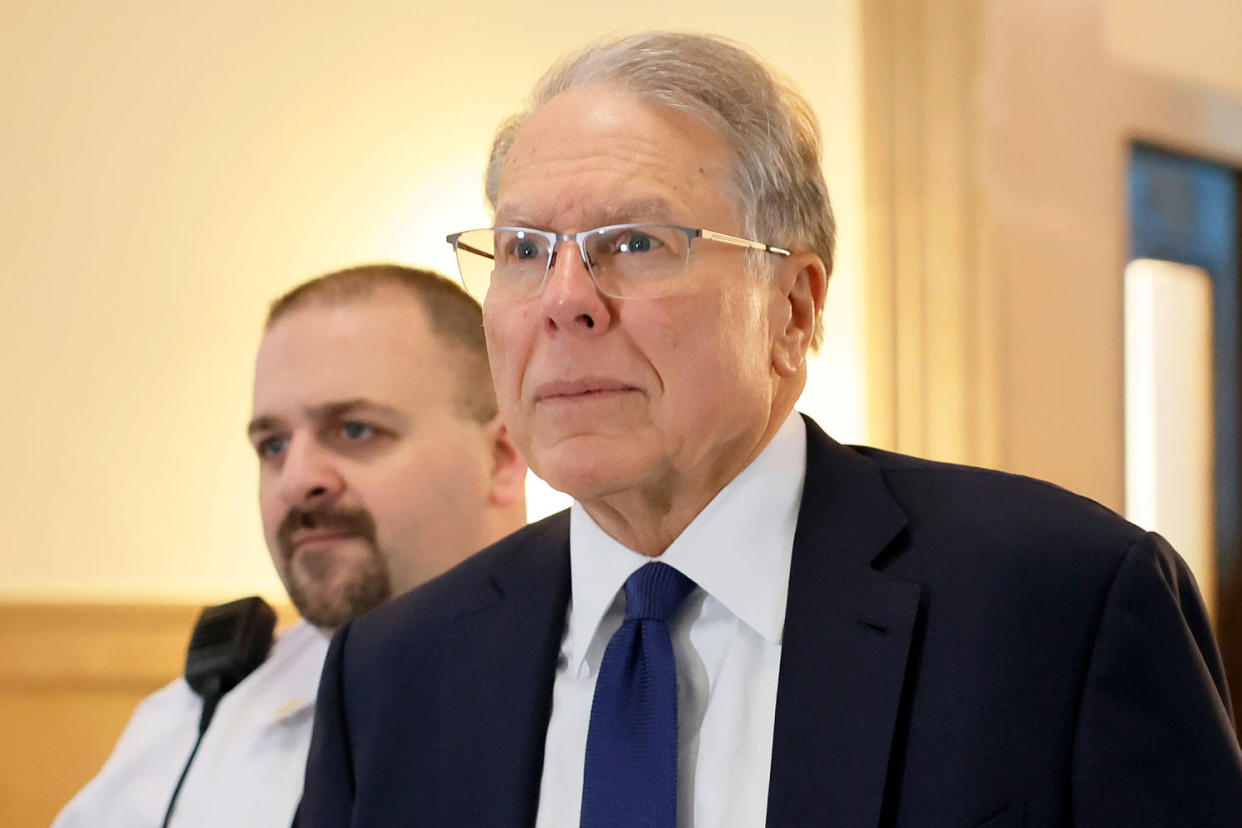NRA and Wayne LaPierre accused in civil case of diverting millions to fund lavish spending
National Rifle Association leader Wayne LaPierre drew millions of dollars away from the gun rights group to spend on “lavish perks” for himself as the NRA flouted nonprofit laws and evaded oversight for decades, plaintiffs alleged Monday during opening arguments in the New York civil trial against the organization and its executives.
LaPierre sat expressionless in a Manhattan courtroom as Monica Connell, an attorney with the New York State Attorney General’s office, told a 12-member jury that he was allowed to “operate the NRA as Wayne’s World for decades.”
“This case is about corruption,” Connell said. “It’s about breaches of trust and power.”
LaPierre, 74, has led the NRA for more than 30 years as the organization’s executive vice president. On Friday, as jury selection neared an end, he announced he would resign from the group at the end of the month.

He, along with other current and former NRA leaders and the organization as a whole, are fending off a lawsuit brought by New York Attorney General Letitia James in 2020 that alleges they violated nonprofit laws and misused millions of dollars of NRA funds for personal use.
The lawsuit alleges that LaPierre diverted millions of dollars away from the group’s charitable mission for his personal use of private jets, expensive meals, travel consultants, private security and trips to the Bahamas for him and his family.
The suit claims LaPierre spent more than $500,000 of the NRA’s assets to fly himself and his family members to the Bahamas. From May 2015 to April 2019, the NRA incurred over $1 million in expenses for private flights on which LaPierre was not a passenger, according to the lawsuit.
“They traveled all over the world for free,” Connell told the jury.
LaPierre received more than $1.2 million in expense reimbursements from 2013 to 2017, the lawsuit alleges.
The other defendants, including the NRA itself, are also accused of violating nonprofit laws and internal policies as they enriched themselves, the suit says, contributing to the NRA’s loss of more than $64 million in three years.
They are Wilson “Woody” Phillips, a former NRA treasurer and chief financial officer, and John Frazer, the corporate secretary and general counsel.
“You will see that the other defendants went along with this,” Connell said. “The NRA didn’t do anything about it.”
NBC News reached out to LaPierre, Phillips and Frazer for comment, but they did not immediately respond.
In a statement, NRA counsel William A. Brewer III said the opening day of the trial "underscores what’s long been clear" — that the attorney general "can prove that former and rogue employees stole from the NRA."
“They cannot prove that the Association or its board did anything wrong," Brewer said. "The NYAG outline of the case is about the past, not the present, which is obvious: only one of the individuals sued remains at the NRA."
Joshua Powell, a former chief of staff and executive director of general operations, was also a defendant. But he reached a $100,000 settlement agreement with the attorney general’s office Friday and admitted to the allegations, James confirmed in a statement Saturday.
A 12-member jury, sworn in Monday afternoon, will spend the next six weeks hearing testimony from roughly 120 witnesses. Six of them will deliberate, while the others will serve as alternates.
If the jurors find the individual defendants liable, they will recommend the amount of money that each defendant would have to repay the NRA.
They would have also been tasked with recommending whether LaPierre should be ousted from the helm of the group, but LaPierre’s resignation has rendered that moot.
In a potential second phase of the trial, State Supreme Court Judge Joel Cohen, who has the final say over monetary damages and remedies, could determine whether the defendants should be permanently barred from serving on the board of any charity in New York and whether an independent monitor should oversee the NRA’s finances.
None of the defendants has been criminally charged as part of James’ lawsuit.
The trial begins after years of failed attempts by the defendants to dismiss the lawsuit, change the court venue and countersue. The NRA also filed for Chapter 11 bankruptcy.
James initially set out to dissolve the NRA as part of her suit. However, Cohen dismissed that effort in 2022, saying her complaint “does not allege the type of public harm that is the legal linchpin for imposing the ‘corporate death penalty.’”
The lawsuit also targets the NRA as a whole. The organization has operated as a nonprofit charitable corporation in New York since 1871. Its assets are required by law to be used in a way that serves the interests of its membership and advances its charitable mission.
In the last few years, the NRA has been considerably weaker, with less influence in the political sphere and fewer members. Membership fell to 4.2 million from nearly 6 million five years ago, The New York Times reported. Membership dues dropped by $14 million from 2021 to 2022, according to an audit filed as part of the lawsuit.
The prosecution wrapped up its opening statement on Monday. The defense will deliver theirs on Tuesday.
